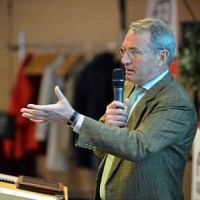FEI Executive Board member and Technical Committee chair John Madden (USA) was the keynote speaker during the Event Classification System session at the FEI Sports Forum 2014. Photos (c) Germain Arias-Schreiber/FEI.
Lausanne (SUI), 28 April 2014 – FEI President HRH Princess Haya welcomed more than 300 delegates to the third FEI Sports Forum, which opened at the prestigious IMD business school in Lausanne (SUI) today.
Addressing delegates from 70 National Federations, representatives of the FEI Associate members, experts, guests, FEI Bureau and Technical Committee members, and FEI staff, the FEI President stressed the importance of the annual Sports Forum in her opening address.
“This is one of the most important meetings on the FEI calendar, because this is where we hear first-hand from the people who are most directly involved in running our sport,” she said. “We need your help to ensure that decisions made at the General Assembly are grounded in reality.
“This forum comes at an exciting time for our federation. The extremely successful London 2012 Olympic Games showed our sport at its best in an iconic venue before a massive global audience. We are building on that momentum with new sponsors and the excitement provided by a new generation of emerging equestrian superstars. With help from FEI Solidarity, our sport is developing in new regions.
“This is also a challenging time. We can never take our place on the Olympic Programme for granted. We are continuing to seek new commercial partners to strengthen our financial foundation. And we must never rest in the ongoing effort to deter and detect the few who seek unfair advantage. Your work here will help us meet those challenges and make the most of the opportunities before us.”
The Sports Forum’s first session focused on the Jumping Event Classification System (ECS) with FEI Executive Board member and Technical Committee chair John Madden (USA) as the keynote speaker. The panellists were Ludger Beerbaum (GER), four-time Olympic champion; Peter Bollen (BEL), equine nutritionist and President of the International Equestrian Organisers Association (IEOA); Juan-Carlos Capelli (ITA), Vice-President and Head of International Marketing of Longines; Jacky Delapierre (SUI), Founder and CEO of Athletissima, Lausanne’s annual athletics sporting event which is part of the IAAF’s Diamond League; Jon Doney (GBR), FEI Official and course designer; and Carl Spencer (USA), management and market research consultant.
John Madden briefly reviewed the background of the ECS, which was first introduced for Jumping in 2010, with the long-term goal of evaluating all Jumping events according to a standardised template of objective criteria. The concept was discussed at the inaugural Sports Forum in 2012 when delegates agreed that the prize-money-only system currently in place for grading events did not encourage event organisers to improve their facilities, as excellence was not rewarded.
After some fine-tuning of the evaluation template, a new ECS was trialled in spring 2013 at Western European League events of the Longines FEI World Cup™ Jumping series. The system took into account all the factors that contribute to a top event, including the level of the competition and venue facilities.
Madden identified the three essential goals of the newly developed system:
- The collection of useable feedback for organisers and FEI Headquarters based dupon clear, concise standards;
- a streamlined cost- and time-effective evaluation system which engages all enthusiasts;
- gathering information through systems already in place for ease of implementation.
He then presented the proposed ECS strategy, including the collection of the existing officials’ reports, draft schedules, and host agreements which will be incorporated into a manageable FEI reporting data base. A scorecard for the event would then be produced and sent to the event organisers for feedback.
The appointment of account executives for FEI series to be involved in the data collection process, and the implementation of an early warning system, open to all data collectors, through which the relevant FEI HQ departments could be speedily alerted if serious problems were encountered at an event, were also presented, and the actions to be implemented before, during, and after the event were outlined.
Carl Spencer of market research provider KS&R, presented the current status of the ECS, based on information extracted from existing documents. He stressed that data collection would not be transformed into an independent activity but would be conducted through existing channels, and highlighted the importance of automation and the use of online facilities.
Next steps in the ECS development were identified as the review of the implementation protocol and timetable, the automation of the officials’ reports, and the finalisation of the scoring system.
During the following open debate, Jacky Delapierre highlighted the importance of television production, particularly for top events. Ludger Beerbaum, commenting on behalf of the International Jumping Riders Club (IJRC), encouraged the FEI to implement the ECS and emphasised the importance of strategic forward thinking. “We need to think where our sport wants to be in 20 or 30 years,” he said. “We should consider a long-term vision and never let our connection with the Olympic Games out of sight.”
Delegates from Australia, Canada, Denmark, Finland, France, Germany, Great Britain, Greece, Ireland, Poland, and Saudi Arabia discussed the pivotal role of the NFs and their involvement in the evaluation system, the need to avoid duplication of tasks, the weighting of the scores attributed to the facilities for the horses, the involvement of grooms, the use for developing nations, the need for simplicity and feedback.
“A lot of work still remains to be done, especially where IT developments are concerned, but let’s not have paralysis over perfection,” John Madden said at the conclusion of the session. “Our objective is to launch the system later this year to evaluate events wishing to be part of the Longines FEI World Cup and the Furusiyya FEI Nations Cup. I am grateful for the very valuable comments we got from the Forum today and given the positive feedback and everyone’s willingness to take part, I am looking forward to a great step forward for our sport.”
Equine Surfaces
The second morning session focused on the Equine Surfaces White Paper, an extensive study into the effect of arena surfaces on the orthopaedic health of sport horses, published earlier this month by the FEI.
The white paper is the result of a four-year collaboration between eight equine experts from six universities, three equine and racing-specific research and testing centres and two horse charities in Sweden, the UK and United States.
Highlights of the white paper were presented by Lars Roepstorff (SWE), professor of functional anatomy of domestic animals at the Swedish University of Agricultural Sciences. A layman’s version of the white paper, Equestrian Surfaces – A Guide, was presented to delegates, and is available to download here.
Footing formula
Brand new rider-focused research was detailed by Professor Roepstorff, based on views from more than 350 riders in warm-up and competition arenas at 10 4- and 5-star events in 2013, resulting in over 600 “footing feedbacks”.
Ludger Beerbaum, who also featured on the Footing panel, took part in the research. “Footing is our primary daily concern,” he said. “It’s vital that we have the best possible ground for our horses when we’re training at home and when we travel for competitions. When the footing is good, our horses are healthy. Getting the footing right is already complex, and we’re also training and competing in different climates outdoors and indoors throughout the year.
“Ongoing research into footing is key to prolonging the careers of our horses. I and the other riders who have taken part in this research all feel that major advances have been made in understanding footing, and we’ll continue to be part of further studies.”
“Now, thanks to extensive scientific knowledge and data collected on footing by our global experts, and this latest valuable rider research, the FEI is able to provide clear guidance on the specifications and maintenance of footing for working areas and competition arenas to the entire equestrian community,” said John McEwen (GBR), FEI 1st Vice-President and Chair of the FEI Veterinary Committee.
“This will have an extensive impact on horse health and performance, and represents a major step forward for riders and stable owners. Organisers will also benefit from having very specific details on the best formula for footing at major events.”
Frank Kemperman (NED), Chair of the FEI Dressage Committee and organiser of the CHIO Aachen (GER), was joined on the panel by Oliver Hoberg (GER), who has been responsible for footing at numerous major equestrian events around the world since the 1990s, including the FEI World Cup™ Final 2003 in Las Vegas, the Beijing 2008 Olympic Games and the London 2012 Olympic Games. He is now in charge of the footing for the Nanjing 2014 Youth Olympic Games, which take place this August.
The importance of footing maintenance was underlined in the following open discussion. “The footing is only as good as the maintenance, and good maintenance requires dedication,” underlined Hoberg. “It is all about carefully studying a horse’s response to footing in varying situations and having a focused and consistent maintenance approach.”
An online discussion platform to continue the debate on all topics discussed at the FEI Sports Forum 2014 is available here: http://sportsforum.fei.org/.
The Equine Surfaces White Paper has been funded by the FEI, World Horse Welfare, the Swedish Foundation for Equine Research and the British Equestrian Federation, working with lead author Dr Sarah Jane Hobbs – research lead in equine biomechanics at the University of Central Lancashire (GBR) and member of Research and Consultancy in Equine Surfaces (RACES) – and seven equine scientists and researchers in the UK, USA and Sweden.
The panellists for the FEI Footing Forum were Ludger Beerbaum (GER), four-time Olympic champion; Oliver Hoberg (GER), footing consultant; and Frank Kemperman (NED), FEI Dressage Committee chair.
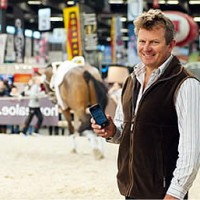
FEI launches new SportApp
The FEI launched its free FEI SportApp on the first day of the FEI Sports Forum.
The app allows users access to the FEI’s entire sports calendar, including detailed programmes and schedules.
FEI athletes can also use the app to see clearly which events they are entered for with their horses, get live information on their upcoming entries and sign up to push notifications for every accepted entry.
The app, available now on the Apple Store and Google Play (for Android), will be further developed to include specific functionalities for grooms, officials and event organisers.
“We have thousands of events in our 2014 calendar, and we will have more next year as our sport continues to grow globally,” said Gaspard Dufour, FEI IT Manager at today’s launch to more than 300 delegates at the FEI Sports Forum.
“The FEI SportApp is a must-have for those who want to follow key events, and is essential for athletes planning their campaigns and organising their lives around their busy competition schedules,” explained Dufour.
Sustainability and IT initiatives feature at FEI Sports Forum
The FEI Sustainability Programme and the proactive sustainable steps that can be taken at equestrian events around the world were detailed by Dr Harald Müller (GER), FEI Director Education and Standards, to open the afternoon session of the FEI Sports Forum 2014.
The new FEI Sustainability Handbook for Event Organisers, circulated during the session and also available online, encourages organisers to implement sustainability initiatives based on their own set priorities to help reduce negative environmental impact and create positive legacies.
“Sustainable sporting events are a major priority for organisers and the network of organisations who help make these happen – governments, sponsors and the communities in which the events takes place to name just a few,” Dr Müller said.
“Equestrian events are unique in many ways, and are also very different to each other based on geography, existing infrastructure and financing, but they do have one thing in common: sustainable action can be taken at every event. The FEI Sustainability Handbook is designed to highlight how, and also what proactive measures can be taken in the future.”
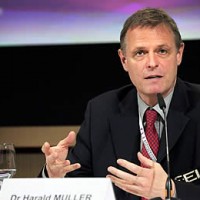
The FEI will introduce several sustainability initiatives, including an interactive web platform, which will include a knowledge database and diverse sustainability benchmarking tools to enable event organisers to work together with the FEI and with each other on development.
“Respect for nature has always been integral to equestrian sport through its connection to horses and the outdoors,” FEI President HRH Princess Haya said today. “The Sustainability Handbook for Event Organisers gives us a solid framework to improve and expand our efforts to protect the environment and ensure that equestrian events create a lasting positive legacy.”
Jeremy Edwards (AUS), Venue General Manager of the London 2012 Olympic and Paralympic Games, Singapore 2010 Youth Olympic Games and Equestrian Site Manager for the Beijing 2008 Olympic Games, and now General Manager of the Baku 2015 European Games Operation Committee, underlined the importance of having an established sustainability policy for equestrian events.
“The sooner we have clear sustainability guidance for organisers to follow the better,” he said. “In reality, we have a very short period of time to consider sustainability at events, and to include it at every stage of the build-up. We need considered sustainability targets for equestrian events, timeframes and strong monitoring throughout the event preparation, and also full feedback post-event for clear learning and implementation next time. That would be an ideal sustainable approach in my view.”
The four-strong panel on the FEI Sustainability Programme session also included Steve Aeschlimann (SUI/ITA), Executive Director of Operations, Fédération Internationale de Motocyclisme (FIM); Denis Bochatay (SUI), Project Manager at environmental life cycle assessment consultancy Quantis; and Simon Lewis (GBR), Founder of Team Planet, a specialist consultancy providing sport sustainability advice.
Online Entry System
The FEI Online Entry System, the single platform that enables Organising Committees and National Federations to process the entries of athletes and horses to manage results more efficiently, was reviewed in the second afternoon session.
Gaspard Dufour, FEI IT Manager, highlighted the key system developments and outlined areas for further improvement with the National Federations.
FEI Sports Forum delegates were invited to give feedback on how the system has facilitated their work and discuss ways in which it could be further improved.
Justin Provost (USA), Director of Information Technology at the United States Equestrian Federation (USEF) and panelist for the session, highlighted the benefits of the FEI Online Entry System and underlined its importance against the backdrop of increasingly busy competition schedules. “The system gives us important athlete information at our finger tips, and is very easy to use, which is vital for our busy athlete services team who, on a yearly basis, are dealing with the needs of thousands of athletes,” he said.
The panelists on the FEI Online Entry System session included Stephan Ellenbruch (GER), FEI Official, FEI Jumping Committee member and President of the International Show Jumping Officials Club; Peter Bollen (BEL), President of the International Equestrian Organisers Association and equine nutritionist; Andreas Steidle (GER), Founder of Equinis and creator of the Hippobase online entry system, and Aurélien Jost (SUI) and Pascal Rossier (SUI) of Swiss Timing.
An online discussion platform to continue the debate on all topics discussed at the FEI Sports Forum 2014 is available here: http://sportsforum.fei.org/
The FEI Sustainability Handbook for Event Organisers is available online here. The FEI encourages sustainable viewing of the handbook, however the FEI does have a limited supply of the handbook in hard copy. Please contact Somesh Dutt somesh.dutt@fei.org.
FEI Media Contacts:
Ruth Grundy
Manager Press Relations
ruth.grundy@fei.org
+41 78 750 61 45
Malina Gueorguiev
Manager Media Relations
Email: malina.gueorguiev@fei.org
Tel: +41 787 506 133
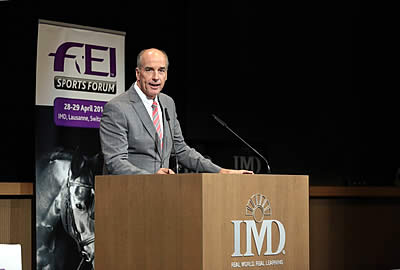

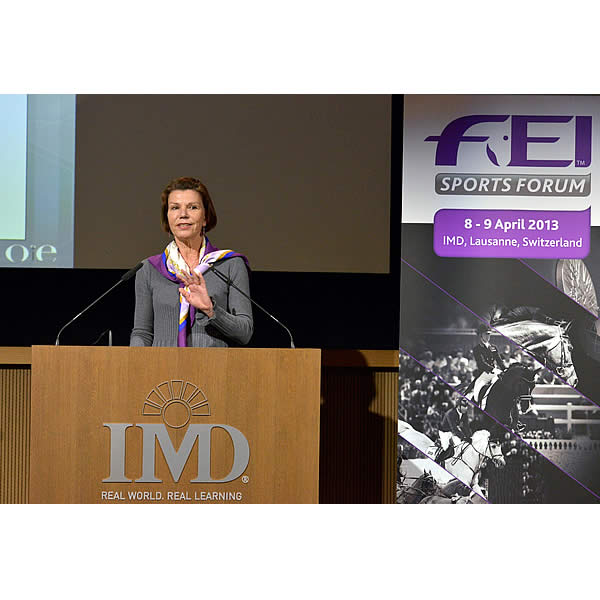
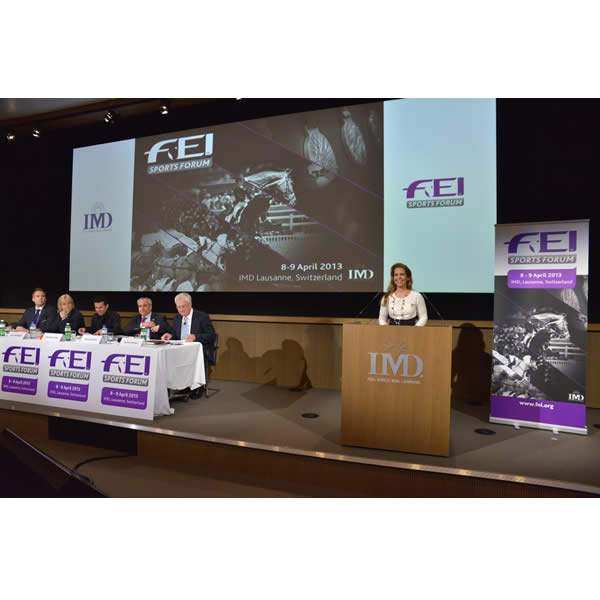
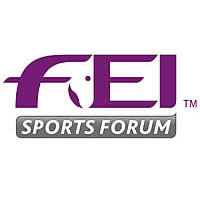

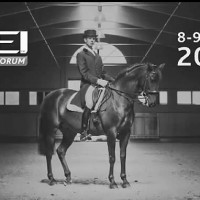
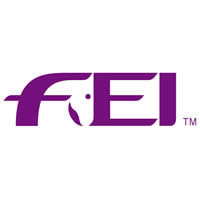 Lausanne (SUI), 4 May 2012 – The inaugural FEI Sports Forum, which opened on 30 April in the Olympic capital Lausanne (SUI) for three days of discussion to help shape the future of equestrian sport, has now moved online.
Lausanne (SUI), 4 May 2012 – The inaugural FEI Sports Forum, which opened on 30 April in the Olympic capital Lausanne (SUI) for three days of discussion to help shape the future of equestrian sport, has now moved online.